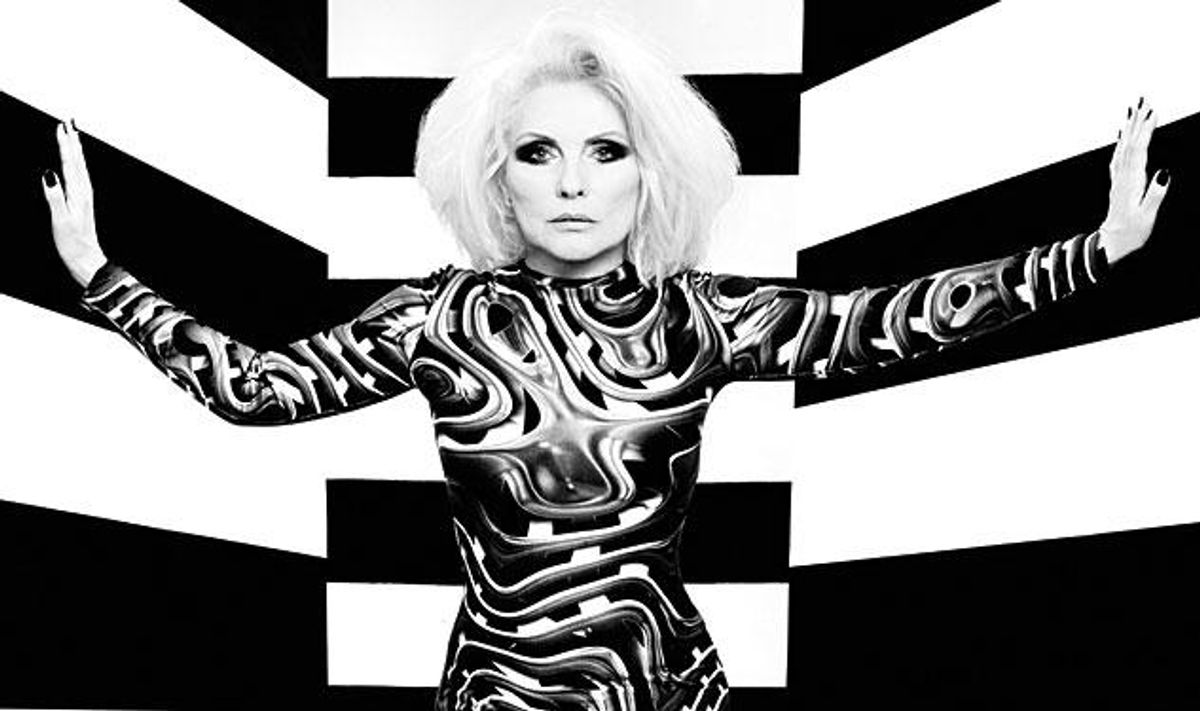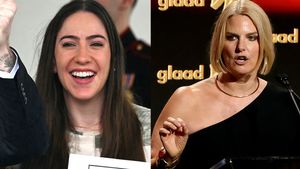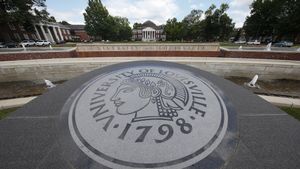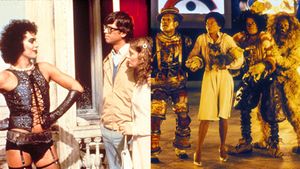
CONTACTAbout UsCAREER OPPORTUNITIESADVERTISE WITH USPRIVACY POLICYPRIVACY PREFERENCESTERMS OF USELEGAL NOTICE
© 2025 Pride Publishing Inc.
All Rights reserved
All Rights reserved
By continuing to use our site, you agree to our Private Policy and Terms of Use.
Photography by Ruven Afanador
In a photo studio in Williamsburg, Brooklyn, Debbie Harry is sitting on a couch, looking fantastic -- as she does; that's her thing -- talking about Beth Ditto of the Gossip, with whom she duets on the new Blondie album, Ghosts of Download. "She is a terrific girl. I love the fact that she's crazy -- an independent spirit." She smiles wryly. "And, you know, I like tough girls."
"She's a fabric of her own imagination, not somebody else's," she continues. "Which is really important."
And just like that, the pop legend with a silvery soprano, who was labeled the Marilyn Monroe and Garbo of punk, draws a direct line from herself to a zaftig mascara fetishist with a Mack-truck yelp. But it makes complete sense: Harry is a pop legend because she was also a fabric of her own imagination, and her group, Blondie, is one of the all-time great pop bands -- the strands of their craft and experimentation are woven into so many other bands it's impossible to count.
Blondie formed on New York City's Lower East Side in 1974, a foursome led by Harry and her boyfriend, guitarist Chris Stein, after Harry did time as a secretary and Playboy Bunny. Their first album, Blondie, was a brilliant straddle of pop and parody, a tough, ironic update of '60s girl groups, featuring Harry singing from the perspective of a street hooker trying to seduce the cop who busted her (on "X Offender"), telling a lover "I could give you some head / And shoulders to lie on" (on "Look Good in Blue"), and celebrating kung fu and monster movies. It all was arch, uncommonly smart, and incredibly catchy. The band was aware that they had a significant gay audience "from the very beginning," says Harry proudly, recalling how they played one of the early Gay Pride events in New York City.
The first Blondie album one tends to think of is 1978's Parallel Lines, the band's third, which broke them worldwide courtesy of the number 1 hit "Heart of Glass," a slinky disco anthem with a twist: Instead of the lamentations of an overheated, lovelorn diva, the song is one long shimmering, syncopated shrug, with Harry dismissing a lover by calling him "a pain in the ass"; you can hear the epic eye-roll in the band's "da da da" refrain.
When she hears the album's songs today, "I think that it was, like, the quintessential Blondie," she says. "We had been working for about five years at that point, and we'd had some success on the first two albums in Europe, but nothing in the States. The producer on those first two albums was Richard Gottehrer, and he had a looser approach. And then we went in with Mike Chapman, who was a guy dedicated to making songs that can be heard on radio and really heard well."
One of the specific contributions of Parallel Lines was its reversal of gender roles. "Hanging on the Telephone" sees a female narrator trying to coax a boyfriend out of his mother's house ("Did she go to work or just to the store? / All those things she said I told you to ignore"), and "One Way or Another" is all stalkerish sexual aggression, with Harry notifying her target that she was gonna "getcha getcha GITCHA!" -- then dump him. "That was a very specific agenda of mine," she says. "I did not want to portray myself, or girls, as victims. I was so sick of it. Every song you hear was all, 'Oh, I've been hurt. I'm so wounded.' I'd just had my fill of that. I mean, everybody gets hurt, and I have definitely written stuff about being hurt, but I definitely wanted to present an attitude. I think it was perfect for me, because when I was growing up, I had a lot of things to fight through, so I had this aggression thing going, I had some anger. I came through it at the perfect time for that to happen."
As Blondie progressed through six albums, the band soon proved it had no patience for nostalgia, pushing the pop charts forward into rap ("Rapture") and calypso ("The Tide Is High"), and then achieving radio ubiquity with "Call Me," the driving theme song to American Gigolo, which topped the charts for six weeks in 1980, becoming the No. 1 song of the year. But they were too restless to stay together -- drug use and lawsuits by two members of the band didn't help -- and after one listless final album, they split in 1982. After some years in the wilderness (partly an Emersonian self-inducement, by Harry's own admission), she and Stein got the band back together in 1997 and scored a U.K. No. 1 with "Maria" two years later.

"It's a composite," she says, assembled with a number of contributors, with Harry and Stein sending MP3s back and forth to writers and the producer. "It wasn't like [early] Blondie, where you were physically in the studio laying down tracks and overdubs," she says. "It's freeing -- the digital kind of mind, it works more like the human mind," she says. "You can jump between things, and you don't have to physically do something to make it happen. You think it, and it's done. That's what the digital thing is. I used to sit in the studio for hours thinking, Oh my God. How do they do it? It's so dull, it's so boring. Over and over again. So I was totally down for digital."
In addition to the duet with Ditto, Ghosts features a cover of Frankie Goes to Hollywood's "Relax" reinvented as a ballad. "We were doing it live, and it was so much fun to do. Everybody just got right off on it," says Harry unironically.
She sounds terrific, and Deluxe Redux's remakes of the band's classics sound uncannily similar to the originals. How does she feel about her voice these days? "I sometimes wonder," she says a little wistfully. "I've practiced, you know, and had some training since the beginning, gotten some good advice. You live and you learn," she says.
Today, she's more of a humble tradeswoman than pop icon. "I'm happy to be working. Working's always been important to me. I don't know that I'd be very healthy, mentally, if I wasn't working all the time. It might force me into other creative avenues, which could be interesting. But I like to make money."
"There are a lot of really good reasons for me to not stop," she continues. "But one reason for me to stop would be that I sometimes feel it's age-inappropriate. The way I grew up, it was a cultural medium that really was only for the youth. Now it's really changed; it's for everyone. But it lingers in the back of my mind: Am I making a fool of myself, jumping around on stage, singing these songs from 40 years ago that have nothing to do with my emotional life or anything to do with my social life as they once did? Some of them, however, do have a certain amount of truth in them, so I can live with that. I enjoy making a fool of myself, basically."
Back in the day, the band had no concept of an existence 40 years in the future. "It was sort of a day-to-day thing," Harry says. "I think the only objective that we had at the very beginning was to be able to make a record. And you know, become stars," she says with a laugh. "It was pretty much a roll of the dice. It gave us a lot of freedom in some ways, and it made us deal with the industry as artists being creative, and not specifically following the rules. But I can't say that I thought more than a few months in the future."
But things turned out all right. Is she happy with where the band is now? "Well, yes and no," she says. "I'm very happy with the music that we're making and the shows that we're doing. I think they're terrific. But I wish that more people would hear our new music. We're sort of at a level in the industry where we play large festivals, but our own gigs are in theaters of not usually more than 5,000 and 10,000. When we do festivals with, like, 50,000 to 80,000 people, and they're singing our songs, it's great. So then when a promoter says to us, 'Well, we can't book you there because, uh, you're not going to draw enough people,' it's very difficult to accept that."

Always refreshingly no-bullshit about plastic surgery and Botox -- "I've done everything and will continue to do everything," she has said -- Harry now works out regularly with a personal trainer: "You have to be consistent," she says. "And then you can just -- go!" she makes a takeoff motion with her forearm.
Her rock 'n' roll indulgences are few; booze is basically verboten. "I'm not a successful drinker," she says. "I don't have any capacity for alcohol. I enjoy a cocktail or a glass of wine, but I'm happy with just one. Occasionally I smoke, which is probably a really big no-no. But I'll have a glass of wine at the after-show, a few puffs of a cigarette. It's sort of my calm-down ritual."
This year, the band will begin a tour that will take them around the world. As for any other plans: "I think a world tour is enough, don't you?" she says with a laugh.
Harry then dispatches some falsehoods swirling around the band: Blondie's end is not imminent, and this is not, contrary to reports, their farewell tour. "I think Clem [Burke, the drummer] said something to a paper and it went on from there," she says. A long-rumored Blondie movie is still just a rumor, although she's keen for it to happen -- "We'd better get on with making it, before we forget what the fuck we did," she says, laughing again -- and she is supposed to write her autobiography as well, but she's putting it off.
She comes across as someone who is hellbent on pushing forward, just like Blondie did at their commercial peak, and as she gets up to shake my hand goodbye, Harry flashes a very "Heart of Glass"-video smile. Just like that, 40 years seems a very short span indeed.
From our Sponsors
Most Popular
39 LGBTQ+ celebs you can follow on OnlyFans
November 19 2024 9:39 AM
27 LGBTQ+ reality dating shows & where to watch them
March 24 2025 11:32 AM
21 times male celebrities had to come out as straight
November 19 2024 3:33 PM
17 queens who quit or retired from drag after 'RuPaul's Drag Race'
November 30 2024 12:26 AM
Love is in the air! Unforgettable gay kissing scenes from TV & movies
February 12 2025 3:07 AM
48 steamy celebrity Calvin Klein ads the gays won't forget
March 17 2025 5:42 PM
Murray Bartlett's 8 best gay roles in TV shows & movies
February 12 2025 2:33 PM
29 out & proud LGBTQ+ country artists you should be listening to
April 15 2025 3:21 PM
All the 'Drag Race' queens on OnlyFans (& what they're showing)
March 21 2025 10:57 AM
HIV Is Not a Crime Day: Films about HIV & AIDS that you should watch
February 28 2025 1:23 AM
Latest Stories
'Drag Race' star Jiggly Caliente lost 'most of her right leg,' family says
April 24 2025 10:26 AM
'Don't Be Gay': Jerrod Carmichael reveals new HBO comedy special
April 23 2025 3:11 PM
Pope's funeral marred by Trump's blasphemous need to feed his huge ego
April 23 2025 6:00 AM
'Tiger King' Joe Exotic announces marriage to fellow prisoner
April 22 2025 5:02 PM
Pete Hegseth's Pentagon makeup suite is proof hyper-masc is manhood make-believe
April 24 2025 12:00 PM
Walton Goggins goes there in sexy new Speedo pics
April 24 2025 10:14 AM
Lorde is kicking off her new era with a surprise single drop
April 23 2025 4:11 PM
Meet the 18 queens of 'RuPaul's Drag Race All Stars 10'—and learn the new group format
April 23 2025 12:00 PM
Here's why Elon Musk is the new Mike 'MyPillow' Lindell
April 24 2025 10:00 AM
A familiar fate: Queer TV shows that ended in movie finales
April 23 2025 3:38 PM
What 'Conclave' teaches about trans acceptance
April 23 2025 10:00 AM
Robert Irwin—shirtless & with a snake around his neck—revealed as 'DWTS' contestant
April 22 2025 10:37 PM



















































































